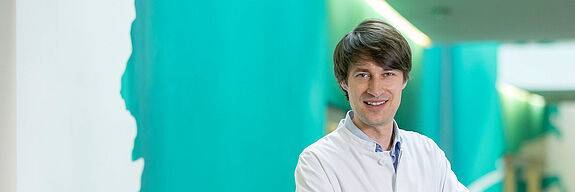Areas of investigation/research focus
Magnetic resonance imaging (MRI) is a key tool for the diagnosis and assessment of the progression of many neurodegenerative diseases. In close cooperation with the “Artificial Intelligence in Medical Imaging” Group (Prof. Martin Reuter) and the group “MR Physics” (Prof. Tony Stöcker), the group “Clinical Neuroimaging” at the DZNE is developing new MR sequences and post-processing techniques with the aim of testing them directly in clinical application. The focus is on the early diagnosis of neurodegenerative diseases and the early detection of potential side effects, especially in the treatment with antibodies (e. g. amyloid-related imaging abnormalities - ARIAs). Imaging markers are also being researched that can potentially determine at an early stage which patients will benefit from a specific therapy.
With the help of artificial intelligence, large amounts of MRI data are examined in order to identify structural features (e.g. volume differences in specific brain regions). Both cohort studies and data from direct clinical routine are used to ensure the best possible translation.
In order to simplify the use of MR examinations, which are currently still associated with considerable effort for patients (staying in the narrow MRI tube for 15-45 minutes), the working group is investigating super-fast MR protocols (MR in a tenth of the time) and the use of portable "ultra low field" MRIs.
Another focus of the group is the establishment of so-called "Brain Clearance Imaging". The aim of this technique is to determine the cerebrospinal fluid flow in the brain parenchyma with the help of new MR sequences and ultra-high-field MRI (7 Tesla). According to one hypothesis, impaired brain clearance may play a central role in the development of neurodegenerative diseases (especially Alzheimer's disease). It is therefore the aim of our research to be able to diagnose impaired brain clearance in vivo at an early stage. Together with European partners, the so-called Human Brain Clearanance Imaging Consortium was founded at the DZNE, which is funded by the EU.

